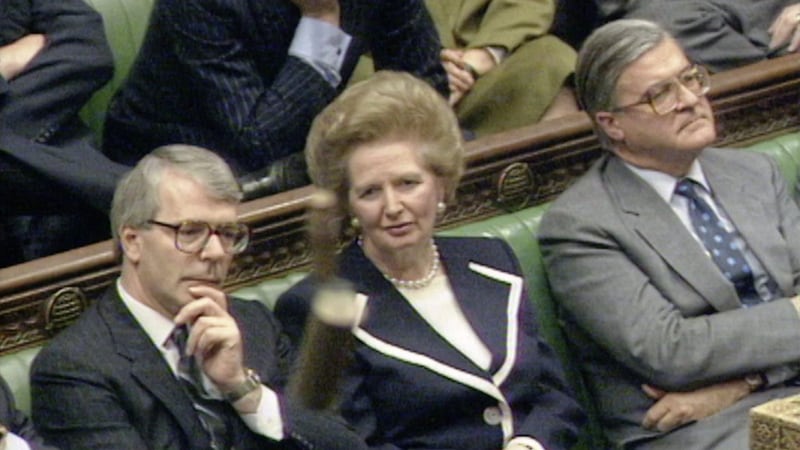Edward Heath, Harold Wilson, James Callaghan, Margaret Thatcher, John Major, Tony Blair, David Cameron, Theresa May, Boris Johnson.
British prime ministers since 1970, each and every one of whom has been accused by unionism of treachery and surrender to republicanism. There’s also a lengthy list of secretaries of state since 1972, most of whom have also been accused of betrayal.
The UUP took the Conservative Parliamentary whip from 1921 and enjoyed a long and supposedly close relationship with the party and its leadership. But that didn’t prevent Edward Heath from throwing it under a bus in March 1972. The party also had a close relationship with Margaret Thatcher when she became Conservative leader in 1975 and believed she would support them on integration. She abandoned them when she became prime minister and ‘betrayed’ them with the Anglo-Irish Agreement.
The UUP propped up John Major’s government after the Maastricht Treaty in 1992, only to be ‘betrayed’ by him with the Downing Street Declaration in 1993 (the British Government has ‘no selfish strategic or economic interest in Northern Ireland.’). The UUP then agreed the UCUNF project (Ulster Conservatives and Unionists—New Force) in 2009, which never really got off the ground thanks to internal differences within both parties. It didn’t help that the Conservatives were also having ‘conversations’ with the DUP at the same time.
In 2017, when the DUP found itself holding the balance of power after the general election, it reached a supply and confidence agreement with the government. During a conversation with a DUP MP at the time I mentioned the long list of ‘betrayals’ the Conservatives had inflicted upon unionism: “We are not the UUP, Alex. We are not puppets. We hold the strings in this scenario and we can destroy the government if it lets us down.” Well, the government didn’t just let it down, it shafted it time after time and there was nothing the DUP could do about it.
All of which leads me to the most puzzling question of all for unionism: if it cannot trust successive UK governments—particularly Conservative ones—to promote and protect its interests as UK citizens, then who does it trust? Ian Paisley, one of the most vocal supporters of Boris Johnson and the ERG during the 2017-19 period, admitted on Wednesday that it had always been difficult to keep Boris Johnson focused on Northern Ireland. He went further and said that Labour had always provided a “better deal” for Northern Ireland: but then plunged down a rabbit hole by claiming he doesn’t trust anyone in politics when it comes to resolving the issues around the NI Protocol.
And yet Paisley and most of his parliamentary colleagues were stupid enough to believe that a Conservative government would ever prioritise ‘Ulster’ unionist interests over the interests of ‘getting Brexit done’ and placating a regenerated English nationalism which didn’t care tuppence about whether or not NI remained in the union. Paisley also ignored the chorus of observers (I was one of them) who warned that supposed allies, like Johnson, Rees-Mogg, Owen Paterson and Theresa Villiers, would always let them down.
There’s another question, too: if it is true that successive British governments have ‘betrayed’ unionism since the prorogation of the NI Parliament in March 1972, then surely unionism has to ask itself why it has been betrayed. Why would Labour and Conservative governments choose to ‘facilitate’ a nationalist/republican/IRA/Irish government/pro-united Ireland agenda rather than side with unionists and promote their agenda? Why would it create an entirely new border between Great Britain and Northern Ireland?
Fair enough, political/societal change was always going to be the primary consequence of the civil rights campaign in the late 1960s. Even Brian Faulkner, in a speech marking the 50th anniversary of Stormont in 1971, acknowledged there had to be new roles and greater input for the ‘official’ opposition. He even managed to persuade the Ulster Unionist Council to support the 1973 White Paper which proposed a power-sharing Assembly elected by PR.
Yet the feeling remained within unionism that it was they who were always being asked to compromise to keep anti-unionists happy. That was their belief in March 1972. It is their belief in March 2022. Fifty years on and they still haven’t found an answer to their multiple questions and concerns about how they are viewed by UK governments. Is it official policy not to have a ‘selfish strategic interest’ in NI? Is it official policy to sever the ropes and raise the anchors that bind NI to GB? Is it in the wider interests of GB to let NI go? Is it official policy to reach a tipping point at which the ‘Irish problem’ should be one for the Irish and the Irish alone?
The failure to have answers to those questions—indeed the failure to even discuss those questions—has left unionism without a credible strategy. More important, it has also left it permanently back-footed and knee-jerkingly responding to each new crisis. Sometimes a willingness to face up to realities is preferable to yet more microphoned rhetoric.







